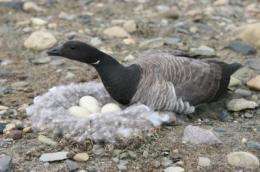Brent geese show parents know best

Research from a six year study on migrating geese has discovered an interesting outcome – they return to the same spots they were taken to as youngsters.
The findings of the study, published online today [November 17] in the journal Molecular Ecology, suggest young light-bellied Brent geese learn their migratory destinations from parents.
This means their routes are learned through culture rather than inherited genetically, raising some interesting questions about why this species of goose demonstrates this behaviour.
Xavier Harrison, from the Centre for Ecology & Conservation (Cornwall) at the University of Exeter, said: "If most offspring settle in the places they were shown in their first year of life, it means there can be a high risk of inbreeding between relatives, which isn't good for the reproductive future of that group. Because of this, it was quite unexpected to find such a high concentration of related birds.
"But there are potential advantages which could explain this pattern. These geese are social foragers, and returning to the same spots to forage with their siblings could allow them better access to food, as related birds may be less competitive over resources.
"Returning to the sites your parents raised you on also makes sense for your own reproductive success, because they have already been proven to be a good choice for producing offspring. It seems that in light-bellied Brent geese, parents know what's best."
Studying the location choices of migratory birds is very difficult due to the large distances they travel. To overcome this, the study saw collaboration between researchers at the University of Exeter, the NERC Biomolecular Analysis Facility at the University of Sheffield, the Wildfowl and Wetlands Trust, and the Icelandic Institute of Natural History.
They were able to combine resources to use genotyping and a database of long term observational data to build up a picture of the locations individuals picked for migration routes.
It showed a recurring pattern – young continuing to follow the routes they learned from their parents and stopping at the same places, or within a very close area in both Ireland and Iceland.
Stuart Bearhop, also from the Centre for Ecology & Conservation (Cornwall) at the University of Exeter, said: "Combining genetic data with observations of marked individuals in their natural habitat is a powerful approach, and has allowed us to gain a detailed understanding of the migratory decisions of young geese.
"The research shows a lot of family structure within light-bellied Brent geese, and suggests a pattern of site use most likely driven by cultural inheritance which is maintained over many years.
"What we're seeing is that groups of animals can be quite independent, and may not mix with others who settle at different locations. This shows how powerful cultural inheritance of migration can be in structuring reproductive isolation among groups, which in turn could have important implications for the development of genetic structure within animal populations."
Provided by University of Exeter












